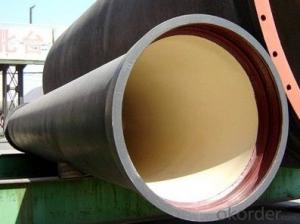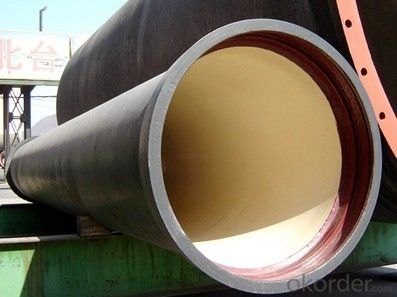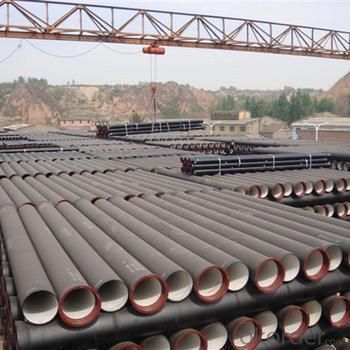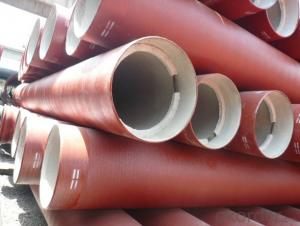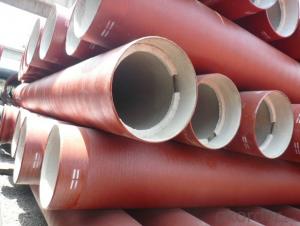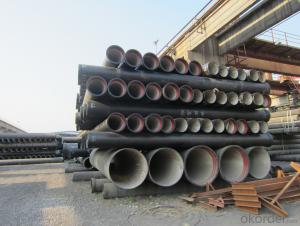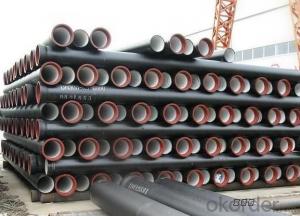Ductile Iron Pipe DN80-DN400 EN545/EN598/ISO2531 For Waste Water
- Loading Port:
- China main port
- Payment Terms:
- TT or LC
- Min Order Qty:
- 28 m.t.
- Supply Capability:
- 200000 m.t./month
OKorder Service Pledge
OKorder Financial Service
You Might Also Like
1,Ductile Iron Pipe Description :
1) Pipes confirm to ISO2531,K9 class,T type joint,6m long,with inside cements lining conform to ISO4179, outside Zinc spraying(130g/m2) and bitumen coating(70μm) conform to ISO8179.
2) Pipe ends: Spigot and socket ends, with 100% SBR rubber gaskets accoding to ISO4633
3) we can do third party inspection according to customer's request.
2,Main Features of the Ductile Iron Pipe:
1).Quality guarantee
• Chemical checking
• NDE after rough machining
• Mechanical testing after heat treatment
• Final NDE,dimension inspected
2).Quality document
• Full Q.A document as per client request
3).Packing and Shipping
• standard export package(carton/wooden case/pallet)
• accept FOB,FAS,CNF,CIF door to door etc or customer designated shipping agent
4)Inspection
• In-house Foundry
• Third party inspection available upon requirement
3,Ductile Iron Pipe Images:
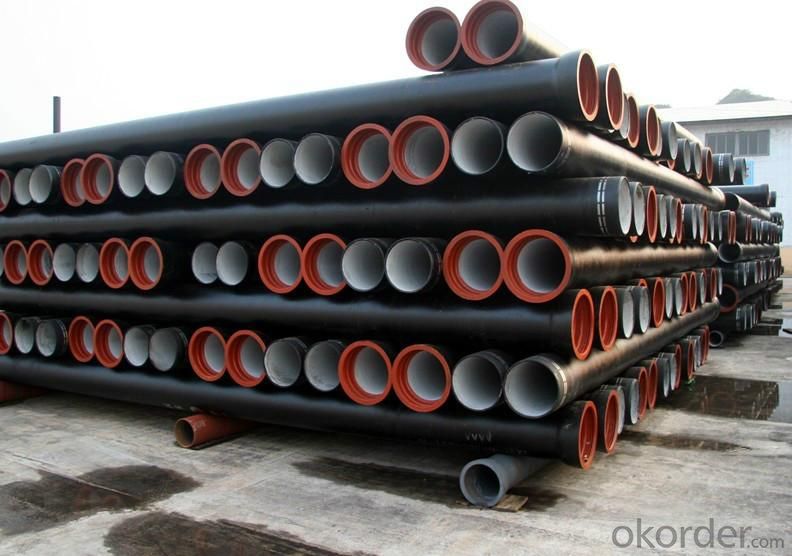
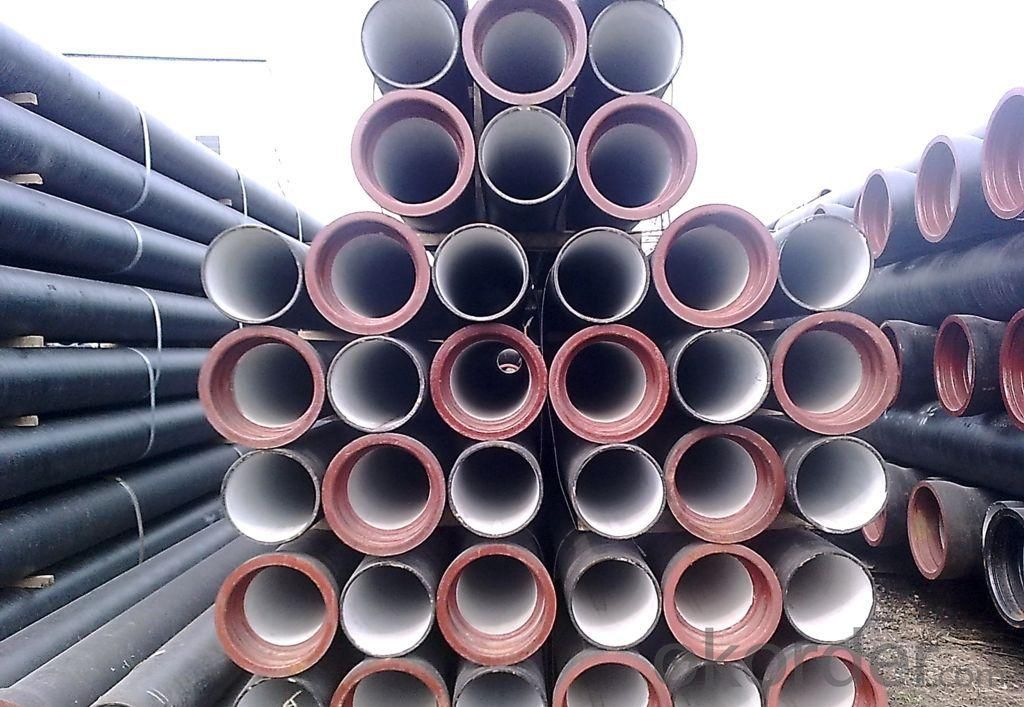
4. Ductile Iron Pipe Specification:
Internal lining: ductile iron pipes shall have an internal cement mortar lining in acc with ISO4179.
External coating: ductile iron pipes shall be externally coated with metallic zinc spray plus a further layer of resin painting to ISO8179.
Gasket: 100% SBR/NBR/EPDM rubber gasket in accordance with ISO4633.
Packing: ductile iron pipes from DN100 to DN300 be bundled with steel belts, others are in bulk.
Payment term: L/C, T/T.
5.FAQ:
We have organized several common questions for our clients,may help you sincerely:
1.Q: Why would you choose ductile iron pipe rather than other pipe materials?
A:The reasons are obvious for that not only ductile iron pipe possesses the inherent strength and flexibility of ductile iron, combined with proven corrosion protection systems, but also the cost savings can be achieved from design to installation and commissioning.
2.Q:Why can you guarantee the inner of pipes can’t be corroded?
A: High alumina cement mortar lining and sulphate-resistant cement mortar lining. These two special linings are applicable to inner anti-corrosion for sewage pipes, improving resistance to erosion of the sewage components.
- Q: Are ductile iron pipes prone to external corrosion?
- Yes, ductile iron pipes are prone to external corrosion.
- Q: Are ductile iron pipes suitable for industrial water systems?
- Yes, ductile iron pipes are suitable for industrial water systems. They possess excellent strength, durability, and corrosion resistance, making them ideal for transporting water in industrial settings. Additionally, their ductility allows them to withstand high pressure and accommodate for ground movement, ensuring long-term reliability in industrial water systems.
- Q: Are ductile iron pipes suitable for use in chemical storage tanks?
- Chemical storage tanks cannot be made with ductile iron pipes since they are not able to resist corrosion caused by different chemicals. While ductile iron pipes possess exceptional mechanical properties, such as high tensile strength and impact resistance, they are not equipped to handle the corrosive nature of chemicals. To ensure the safety and integrity of the tank, materials that can withstand the corrosive properties of the stored chemicals, such as fiberglass-reinforced plastic (FRP), stainless steel, or high-density polyethylene (HDPE), are commonly used for chemical storage tanks. It is of utmost importance to carefully choose the appropriate material for chemical storage tanks in order to prevent leaks, contamination, and potential hazards.
- Q: How does ductile iron pipe perform in areas with high groundwater levels?
- Ductile iron pipe performs well in areas with high groundwater levels. Its durable and corrosion-resistant properties make it suitable for such environments. The pipe's strength and flexibility allow it to withstand the pressure exerted by the groundwater and adapt to any ground movement without compromising its structural integrity. Additionally, ductile iron pipe's protective linings further enhance its resistance to corrosion, ensuring long-term performance in high groundwater areas.
- Q: Can ductile iron pipes be used in areas with high levels of industrial effluents?
- Areas with high levels of industrial effluents can indeed utilize ductile iron pipes. Ductile iron, a variant of cast iron known for its enhanced flexibility and strength, possesses remarkable resistance to corrosion and abrasion. Hence, it is well-suited for managing a wide range of industrial effluents, including those abundant in chemicals, acids, or other corrosive substances. To bolster their defense against chemical attacks, ductile iron pipes feature protective linings, such as cement mortar or polyethylene. These linings serve as barriers, preventing direct contact between the effluents and the iron material. Consequently, the pipes maintain their longevity and integrity. In addition, ductile iron pipes have gained considerable usage in industrial applications involving corrosive environments. They have shown themselves to be dependable and long-lasting, even in demanding conditions. Of course, proper maintenance and regular inspections remain crucial in ensuring the ongoing performance of ductile iron pipes within areas possessing high levels of industrial effluents. It is pivotal to bear in mind the specific characteristics of the effluents and seek guidance from experts or manufacturers when determining the most suitable pipe materials and linings for a particular industrial setting.
- Q: Ductile iron pipe connection mode
- Main points of installation: (1) clean the pipe mouth: clean all the sundries in the mouth. Second, clean aprons, aprons on the adhesive material on the apron: clean up, put the ring bending "plum blossom" or "8" shaped into a socket groove, and hand along the entire ring press again, or with a rubber hammer, to ensure that each part of the warping apron is not twisted, evenly the card in the slot.
- Q: How to analyze and judge the quality of ductile iron pipe
- On the quality of single pipe can analyze it from the surface is sand type and water cooled pipes, K8 pipe is different from Shanxi root nature is that the proportion of grade K9 cement and cast iron pipe and the K8 pipe are different, there is no national standard and non standard, no K8 tube, only is the production plant in order to obtain more profits, the dealer is not up to the national standard K9 grade pipe called K8 grade ductile pipe, K9 pipe cement weighs about 1/5 weight of the pipe, but is played in the role of anti-corrosion, the so-called K8 class water mud proportion some manufacturers terrifying 3/4 or 3/5, as the water supply pipe 3/5 or no personally think that two of the proportion of the tube is no problem
- Q: Are ductile iron pipes suitable for industrial applications?
- Yes, ductile iron pipes are highly suitable for industrial applications. Ductile iron is a strong and durable material that possesses excellent mechanical properties, making it ideal for handling high-pressure and heavy-duty applications. The pipes have a high tensile strength and can withstand extreme conditions, including high temperatures and corrosive environments. Furthermore, ductile iron pipes have superior resistance to cracking and fracturing, ensuring a longer lifespan and reduced maintenance costs. They are also highly resistant to external loads, making them suitable for underground installations and industrial settings where they may be subjected to heavy loads or vibrations. Moreover, ductile iron pipes have excellent flow characteristics due to their smooth interior surface, allowing for efficient fluid transportation in industrial systems. They also have good resistance to wear and abrasion, ensuring a consistent flow rate over time. Additionally, ductile iron pipes are versatile and can be used in various industrial applications such as water supply, wastewater treatment, industrial processes, and mining operations. They are available in a wide range of sizes to accommodate different requirements and can be easily connected using various jointing methods. Overall, ductile iron pipes offer the reliability, strength, and longevity required for industrial applications, making them a suitable choice for industries where durability and performance are crucial.
- Q: How are ductile iron pipes protected against external impact or loading?
- Ductile iron pipes are protected against external impact or loading through various methods. One common method is to apply a protective coating or wrapping on the pipes, which helps to prevent corrosion and reduces the risk of damage from external forces. Additionally, the pipes are often designed with a thicker wall thickness to enhance their strength and resistance to external impact. Furthermore, the installation of appropriate bedding and backfill materials around the pipes provides additional support and protection against external loading. Regular inspections and maintenance practices also play a crucial role in ensuring the long-term durability and protection of ductile iron pipes.
- Q: Classification of cast iron pipes
- Water cast iron pipe:The use of cast iron cast iron water pipe of No. 18 above by adding nodulizer, after centrifugal ductile cast iron pipe by centrifugal casting machine, the performance of ductile iron pipe with nature, iron and steel, excellent corrosion resistance, good ductility, good sealing effect, simple installation, mainly for municipal, industrial and mining enterprises water, gas, oil etc.. Water supply pipe is the first choice, with high cost performance.
Send your message to us
Ductile Iron Pipe DN80-DN400 EN545/EN598/ISO2531 For Waste Water
- Loading Port:
- China main port
- Payment Terms:
- TT or LC
- Min Order Qty:
- 28 m.t.
- Supply Capability:
- 200000 m.t./month
OKorder Service Pledge
OKorder Financial Service
Similar products
Hot products
Hot Searches
Related keywords
